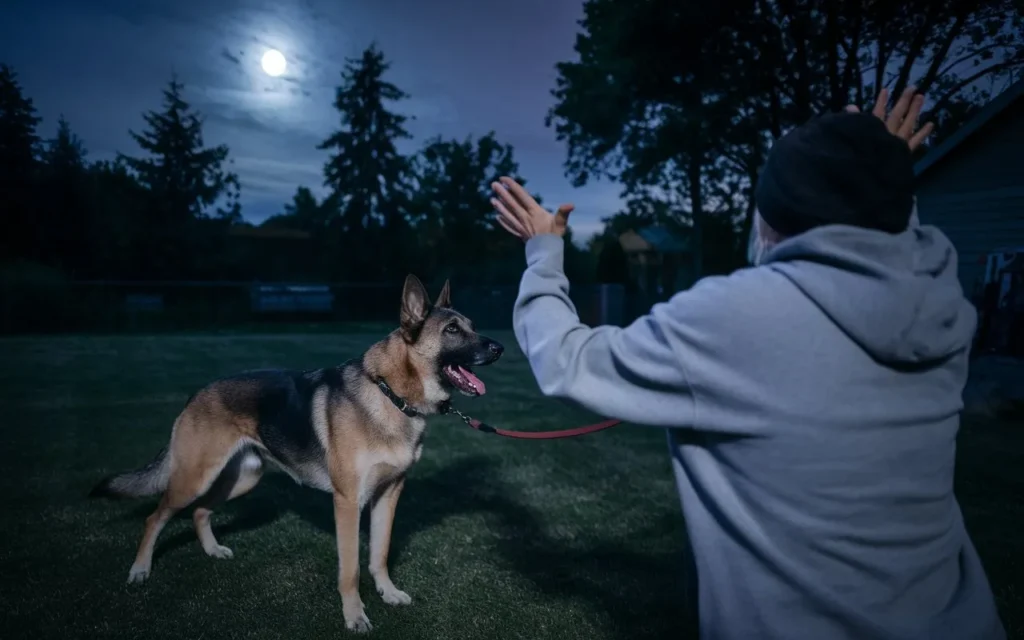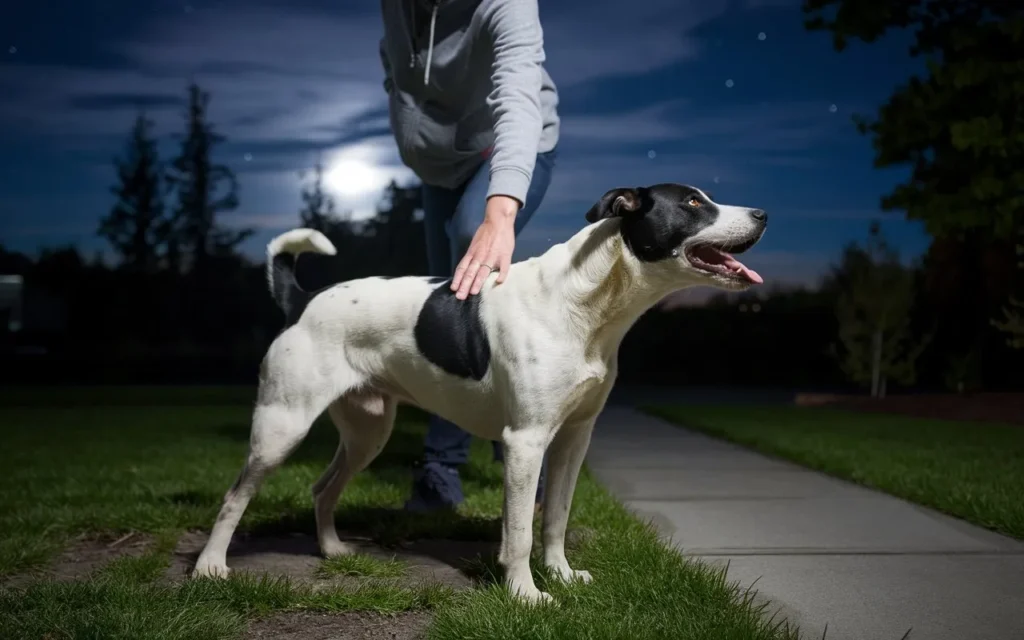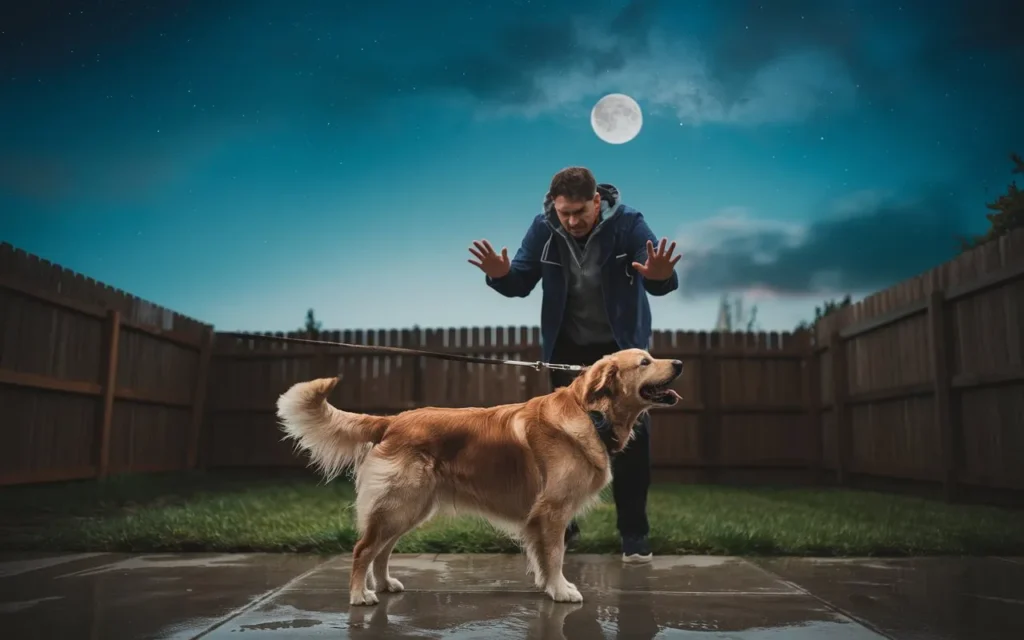introduction : how Do You Stop Dogs from Barking at Night
Are you tired of being kept awake by your furry friend’s nocturnal vocalizations? If so, you’re certainly not alone in wondering how do you stop dogs from barking at night. Fortunately, this comprehensive guide will not only explore the reasons behind nighttime barking but also provide you with effective strategies to restore peace and quiet to your evenings.
Understanding the Root Causes: Why Do Dogs Bark at Night?
Before we dive into solutions, it’s crucial to understand why dogs bark at night. After all, identifying the underlying cause is the first step in addressing the question: how do you stop dogs from barking at night? Let’s explore some common reasons:
1. Territorial Instincts: Guarding Against Nocturnal Intruders
Some canines have territorial instincts and will often defend their territories by barking to ward off intruders they see or hear in the night. Because of this, it is actually one of the most common reasons dogs bark at strangers passing by your property.
2. Attention-Seeking: Nighttime Calls for Companionship
Sometimes dogs bark because they want attention. As a matter of fact, if your dog has learned that barking means you’ll come to check on them, then they could continue this behavior throughout the night since during these quiet hours, it assures them of your attention.
3. Separation Anxiety: Nighttime Distress Signals
Separation anxiety barks excessively when your dog is left alone in the night. It is often characterized by other signs like pacing or destructive behavior, which disturb your sleep.
4. Environmental Triggers: Responding to Unseen Stimuli
Sudden noises, movements, or even changes in light can trigger barking. Given that dogs have much more sensitive hearing than humans, they may be reacting to sounds you can’t even hear, leading to seemingly unprovoked nighttime barking.
5. Medical Issues: Underlying Health Concerns
In some cases, nighttime barking could be a sign of underlying health problems. Specifically, pain, discomfort, or cognitive issues in older dogs can lead to increased vocalization at night, warranting a veterinary check-up.
Now that we understand these root causes, let’s explore ten effective solutions to address the pressing question: how do you stop your dog from barking at night?

10 Proven Techniques to Silence Nighttime Barking
1. Establish a Consistent Bedtime Routine: Creating Canine Calm
One of the most effective ways to stop a dog from barking at night is to establish a consistent bedtime routine. Dogs thrive on predictability, and a set routine can help them understand when it’s time to settle down for the night. Consider the following steps:
- Take your dog for a final walk or potty break before bed
- Offer a small, healthy bedtime snack
- Engage in a calm activity, such as gentle petting or quiet playtime
- Guide your dog to their sleeping area
- Use a specific phrase, like “bedtime” or “sleep time,” consistently
By following this routine every night, your dog will begin to associate these activities with sleep time, making them more likely to settle down quietly.
2. Provide Adequate Exercise: how do you stop dogs from barking at night
A tired dog is a quiet dog. Therefore, ensuring your pet gets enough physical and mental stimulation during the day can significantly reduce nighttime barking. Here are some tips to keep your canine companion well-exercised:
- Aim for at least 30 minutes to an hour of exercise daily, depending on your dog’s breed and age
- Incorporate both physical activities (like walks or fetch) and mental stimulation (such as puzzle toys or training sessions)
- Schedule more intense exercise earlier in the day, allowing time for your dog to wind down before bedtime
Remember, a well-exercised dog is more likely to sleep soundly through the night, thus reducing the likelihood of disruptive barking.
3. Create a Comfortable Sleeping Environment: A Den of Tranquility
Your dog’s sleeping area plays a crucial role in their nighttime behavior. To effectively stop dogs from barking at night, ensure their sleeping space is:
- Quiet and dark
- At a comfortable temperature
- Free from drafts
- Equipped with a comfortable bed or crate
Moreover, consider using white noise machines or soft background music to mask external noises that might trigger barking. Some dogs also find comfort in having an item of clothing with your scent on it in their sleeping area.
4. Address Separation Anxiety: Easing Nighttime Nervousness
If separation anxiety is causing your dog to bark at night, it’s essential to address this issue directly. Here are some strategies to help your anxious pup:
- Gradually accustom your dog to being alone, starting with short periods and slowly increasing the duration
- Offer comforting items like toys or clothing infused with your scent
- Consider using pheromone diffusers designed to calm anxious dogs
- In severe cases, consult with a veterinarian or professional dog trainer for additional support
Remember, addressing separation anxiety takes time and patience, but it can significantly improve your dog’s nighttime behavior.

5. Use Positive Reinforcement Training: Rewarding Quiet Behavior
Positive reinforcement is a powerful tool when learning how to stop your dog from barking at night. The key is to reward quiet behavior rather than punishing barking. Here’s a step-by-step approach:
- When your dog is quiet at night, offer praise and treats
- Slowly extend the length of quiet time needed to earn a reward
- Use a specific command, like “quiet” or “hush,” and reward your dog when they respond correctly
- Never yell or punish your dog for barking, as this can increase anxiety and worsen the problem
Consistency is crucial in this training approach. With time and patience, your dog will learn that being quiet at night leads to positive outcomes.
6. Identify and Remove Triggers: Eliminating Nighttime Nuisances
Sometimes, the solution to nighttime barking lies in identifying and removing the triggers that cause it. Common triggers might include:
- Street noises or passing cars
- Wildlife in the yard
- Lights from neighboring properties
- Other pets in the household
Once you’ve identified the triggers, take steps to minimize their impact:
- Use heavy curtains to block out light and muffle street noise
- Consider using motion-activated sprinklers to deter wildlife
- Separate pets at night if they’re disturbing each other
By removing or reducing these triggers, you can often stop dogs from barking at night without the need for extensive training.
7. Utilize White Noise or Calming Music: Soothing Soundscapes
Background noise can be surprisingly effective in masking external sounds and calming anxious dogs. Consider using:
- White noise machines
- Soft, calming music designed for dogs
- Soothing nature sounds, like soft rain or rolling ocean waves
Experiment with different sounds to find what works best for your dog. Many pet owners find that leaving a radio or television on at a low volume can also provide comforting background noise.
8. Consider Natural Calming Aids: Herbal Helpers for Hounds
For dogs that bark due to anxiety or restlessness, natural calming aids can be helpful. Some options to consider include:
- Pheromone diffusers or collars
- Calming supplements containing ingredients like L-theanine or chamomile
- Anxiety wraps or thunder shirts, which provide gentle pressure to calm nervous dogs
Always consult with your veterinarian before introducing any new supplements or treatments to ensure they’re safe and appropriate for your dog.
9. Implement Nighttime Confinement: Creating a Cozy Canine Cave
While it may seem counterintuitive, some dogs actually feel more secure and bark less when confined to a specific area at night. This could be:
- A crate, if your dog is properly crate trained
- A designated room in the house
- A playpen or gated area
The key is to make this space comfortable and associate it with positive experiences. Never use confinement as a punishment, as this can increase anxiety and barking.
10. Seek Professional Help: Enlisting Expert Assistance
If you’ve tried these strategies and are still wondering how to stop a dog from barking at night, it may be time to seek professional help. A certified dog trainer or animal behaviorist is able to:
- Assess your specific situation
- Identify underlying causes of nighttime barking
- Develop a tailored training plan
- Provide hands-on guidance and support
Additionally, a veterinarian can rule out any medical issues that might be contributing to nighttime barking, especially in older dogs or those with sudden changes in behavior.

Why Do Dogs Bark at Strangers? Understanding Canine Communication
Understanding why do dogs bark at strangers is crucial in addressing nighttime barking issues, especially if your dog tends to vocalize when people pass by your property. Here are some common reasons:
- Territorial Behavior: Dogs often see their home and yard as their territory and may bark to warn strangers to stay away.
- Fear or Anxiety: Some dogs bark at strangers out of fear or anxiety, especially if they haven’t been properly socialized.
- Alerting the Pack: In a dog’s mind, you’re part of their pack. Barking at strangers could be their way of alerting you to potential danger.
- Excitement: Some dogs bark at strangers out of excitement or a desire to greet them.
- Lack of Socialization: Dogs that haven’t been exposed to a variety of people during their critical socialization period may be more likely to bark at unfamiliar individuals.
Addressing this behavior often involves a combination of training, socialization, and management strategies. Here are some tips to help curb your dog’s tendency to bark at strangers:
- Gradually expose your dog to different types of people in a controlled, positive environment
- Teach a “quiet” command using positive reinforcement techniques
- Provide alternative behaviors for your dog to perform when they see a stranger, such as sitting or going to a designated spot
- Use desensitization techniques to help your dog become more comfortable with the presence of strangers
Remember, consistency and patience are key when addressing any behavioral issue, including barking at strangers.
Conclusion: how do you stop dogs from barking at night
Obviously, learning how to make the dogs stop barking at night is rather a process that requires much patience, consistency, and understanding. If you know your dog’s reason for making noise at night and follow these measures, it will be much easier to create a more harmonious atmosphere for you and your pet.
Keep in mind that every dog is different, and what works on one may not on another. If it doesn’t seem to work immediately, do not become discouraged. Give time, show patience, and you can hopefully enable your dog to work out a better pattern of night-time habits and thereby ensure quiet, restful nights together.
If the excessive nighttime barking persists, you really shouldn’t hesitate to seek professional help. A certified dog trainer or your veterinarian is going to assist you further with more valuable insight and solutions tailored to your specific situation.
In that case, taking the time to understand your dog’s nighttime barking may improve not just the quality of life but also your bond with your canine companion. Here’s to peaceful nights and happy, well-adjusted dogs!








